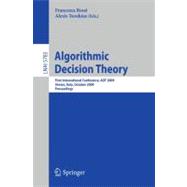
| Social Choice Theory | |
| A Complete Conclusion-Based Procedure for Judgment Aggregation | p. 1 |
| A Geometric Approach to Paradoxes of Majority Voting in Abstract Aggregation Theory | p. 14 |
| Manipulating Tournaments in Cup and Round Robin Competitions | p. 26 |
| Iterated Majority Voting | p. 38 |
| Committee Selection with a Weight Constraint Based on Lexicographic Rankings of Individuals | p. 50 |
| The Effects of Noise and Manipulation on the Accuracy of Collective Decision Rules | p. 62 |
| Subset Weight Maximization with Two Competing Agents | p. 74 |
| The Complexity of Probabilistic Lobbying | p. 86 |
| On the Complexity of Efficiency and Envy-Freeness in Fair Division of Indivisible Goods with Additive Preferences | p. 98 |
| On Low-Envy Truthful Allocations | p. 111 |
| On Multi-dimensional Envy-Free Mechanisms | p. 120 |
| Stable Rankings in Collective Decision Making with Imprecise Information | p. 132 |
| Finding Best k Policies | p. 144 |
| Multiple Criteria Decision Analysis | |
| New Hybrid Recommender Approaches: An Application to Equity Funds Selection | p. 156 |
| A Prescriptive Approach for Eliciting Imprecise Weight Statements in an MCDA Process | p. 168 |
| Inverse Analysis from a Condorcet Robustness Denotation of Valued Outranking Relations | p. 180 |
| Directional Decomposition of Multiattribute Utility Functions | p. 192 |
| The Possible and the Necessary for Multiple Criteria Group Decision | p. 203 |
| Preferences in an Open World | p. 215 |
| Extending Argumentation to Make Good Decisions | p. 225 |
| Building Consistent Pairwise Comparison Matrices over Abelian Linearly Ordered Groups | p. 237 |
| Aggregating Interval Orders by Prepositional Optimization | p. 249 |
| Circular Representations of a Valued Preference Matrix | p. 261 |
| Decision under Uncertainty | |
| The First Belief Dominance: A New Approach in Evidence Theory for Comparing Basic Belief Assignments | p. 272 |
| Interpreting GUHA Data Mining Logic in Paraconsistent Fuzzy Logic Framework | p. 284 |
| Insuring Risk-Averse Agents | p. 294 |
| Adversarial Risk Analysis: Applications to Basic Counterterrorism Models | p. 306 |
| Game Theory without Decision-Theoretic Paradoxes | p. 316 |
| Ranking Methods Based on Dominance Measures Accounting for Imprecision | p. 328 |
| Optimisation | |
| Optimizing the Hurwicz Criterion in Decision Trees with Imprecise Probabilities | p. 340 |
| Axioms for a Class of Algorithms of Sequential Decision Making | p. 353 |
| Algorithmic Aspects of Scenario-Based Multi-stage Decision Process Optimization | p. 365 |
| Choquet Optimization Using GAI Networks for Multiagent/Multicriteria Decision-Making | p. 377 |
| Compact Preference Representation in Stable Marriage Problems | p. 390 |
| Neuroevolutionary Inventory Control in Multi-Echelon Systems | p. 402 |
| Determining a Minimum Spanning Tree with Disjunctive Constraints | p. 414 |
| Learning | |
| An inductive Methodology for Data-Based Rules Building | p. 424 |
| A Framework for Designing a Fuzzy Rule-Based Classifier | p. 434 |
| Anytime Self-play Learning to Satisfy Functional Optimality Criteria | p. 446 |
| Author Index | p. 459 |
| Table of Contents provided by Ingram. All Rights Reserved. |
The New copy of this book will include any supplemental materials advertised. Please check the title of the book to determine if it should include any access cards, study guides, lab manuals, CDs, etc.
The Used, Rental and eBook copies of this book are not guaranteed to include any supplemental materials. Typically, only the book itself is included. This is true even if the title states it includes any access cards, study guides, lab manuals, CDs, etc.